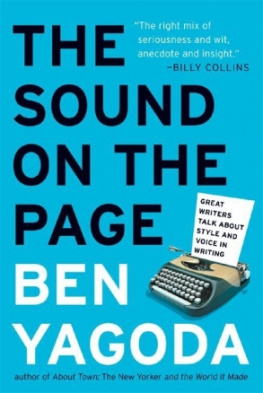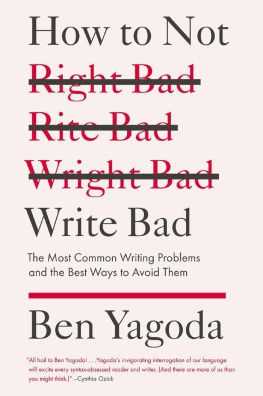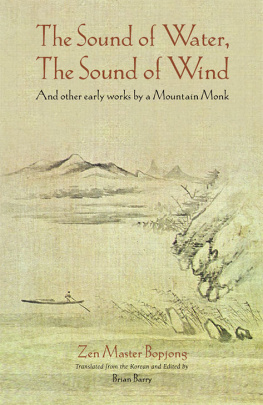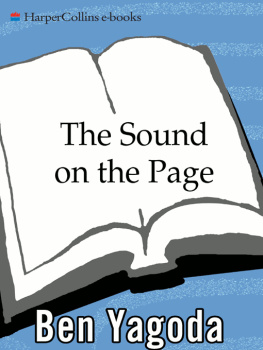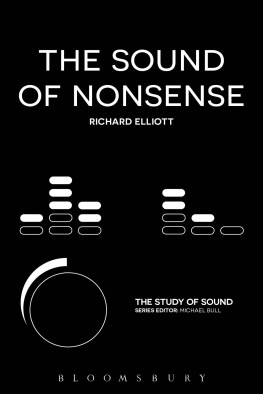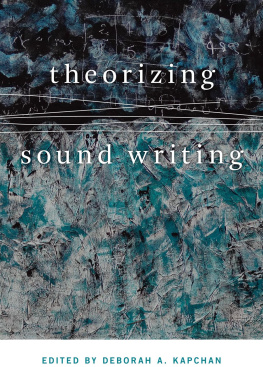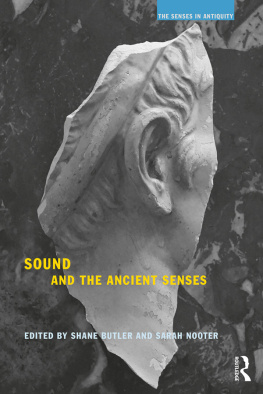Ben Yagoda - The Sound on the Page
Here you can read online Ben Yagoda - The Sound on the Page full text of the book (entire story) in english for free. Download pdf and epub, get meaning, cover and reviews about this ebook. year: 2009, publisher: HarperCollins, genre: Detective and thriller. Description of the work, (preface) as well as reviews are available. Best literature library LitArk.com created for fans of good reading and offers a wide selection of genres:
Romance novel
Science fiction
Adventure
Detective
Science
History
Home and family
Prose
Art
Politics
Computer
Non-fiction
Religion
Business
Children
Humor
Choose a favorite category and find really read worthwhile books. Enjoy immersion in the world of imagination, feel the emotions of the characters or learn something new for yourself, make an fascinating discovery.
- Book:The Sound on the Page
- Author:
- Publisher:HarperCollins
- Genre:
- Year:2009
- Rating:3 / 5
- Favourites:Add to favourites
- Your mark:
- 60
- 1
- 2
- 3
- 4
- 5
The Sound on the Page: summary, description and annotation
We offer to read an annotation, description, summary or preface (depends on what the author of the book "The Sound on the Page" wrote himself). If you haven't found the necessary information about the book — write in the comments, we will try to find it.
Ben Yagoda: author's other books
Who wrote The Sound on the Page? Find out the surname, the name of the author of the book and a list of all author's works by series.
The Sound on the Page — read online for free the complete book (whole text) full work
Below is the text of the book, divided by pages. System saving the place of the last page read, allows you to conveniently read the book "The Sound on the Page" online for free, without having to search again every time where you left off. Put a bookmark, and you can go to the page where you finished reading at any time.
Font size:
Interval:
Bookmark:
Great Writers Talk About Style and Voice in Writing

Dedicated to Russell Baker
for inspiration
Part I
Style from the Outside: Theory
Part II
Style from the Inside: Practice
T his book began with a single and simple observation: it is frequently the case that writers entertain, move and inspire us less by what they say than by how they say it. What they say is information and ideas and (in the case of fiction) story and characters. How they say it is style.
For the first of many times, I present as an example Ernest Hemingway. What is Hemingways content? He has some fishing and war stories that are pretty good, if a little short in the action department, and some ideas about honorable and dishonorable behavior that would puzzle many contemporary readers. His characters, especially in the novels and most especially in the later novels, tend to be tiresome. But his style! Take a look at the first paragraph of one of his first stories, The Three Day Blow:
The rain stopped as Nick turned into the road that went up through the orchard. The fruit had been picked and the fall wind blew through the bare trees. Nick stopped and picked up a Wagner apple from beside the road, shiny in the brown grass from the rain. He put the apple in the pocket of his Mackinaw coat.
The first striking thing about this passage is the action it describes appears to be in no way dramatic, significant, or interesting. The second is that it could only have been written by Hemingway. (I was going to add, or by one of his imitators, but his imitators, with all their talk about how the fishing was good, miss the subtlety and mangle the tone of the original.) Even if by some chance you have not read his work, you will, if you are at all an attentive reader, be struck by the unified, consistent, and ultimately hypnotic sound and feel of it. We note the plain words and short sentences, of courseso pronounced that the comma in the third sentence feels like a consoling arm around our shoulder and the three-syllable Mackinaw at the end a gift outrightbut also the way these technical features create a mood. The reluctance to commit to a complex sentence, a Latinate word, an adverb, or even a pronoun (repeating Nick and the apple instead of substituting he or it ), the urge to describe the world precisely, even at the risk of using eight ungainly prepositional phrases in one paragraph: the more familiar one is with this writer, the most one understands that his stylistic choices express a state of mind, a philosophy of perception, and a morality that we now communicate with one word Hemingway .
Consider, next, the most popular novelist in the English languageCharles Dickens. His characters are types, not people. With some honorable exceptions like Great Expectations and David Copperfield , his plots are unwieldy and ultimately uninvolving. He exposed alarming social conditions, but these have, for the most part, been taken care of. His comic set pieces, no doubt side-splitting in their day, are coming up on 150 years old and read like it; his sentimentality handed Oscar Wilde his best moment in Bartletts Familiar Quotations . (One must have a heart of stone to read the death of Little Nell without laughing.) So why could you roam the Contemporary Fiction shelves at Barnes & Noble for a year and still not find a writer as stirring and alive? Benjamin Disraeli suggested the answer when he observed, It is style alone by which posterity will judge of a great work. Here is how Dickens opens Bleak House :
London. Michaelmas term lately over, and the Lord Chancellor sitting in Lincolns Inn Hall. Implacable November weather. As much mud in the streets as if the waters had but newly retired from the face of the earth, and it would not be wonderful to meet a Megalosaurus, forty feet long or so, waddling like an elephantine lizard up Holborn Hill. Smoke lowering down from chimney-pots, making a soft black drizzle, with flakes of soot in it as big as full-grown snowflakesgone into mourning, one might imagine, for the death of the sun. Dogs, undistinguishable in mire. Horses, scarcely better; splashed to their very blinkers. Foot passengers, jostling one anothers umbrellas in a general infection of ill temper, and losing their foot-hold at street-corners, where tens of thousands of other foot passengers have been slipping and sliding since the day broke (if this day ever broke), adding new deposits to the crust upon crust of mud, sticking at those points tenaciously to the pavement, and accumulating at compound interest.
It is a muddy day, all rightthat much is clear. But thats not the point. The point is that Dickens, or, rather, the narrator of Bleak House , knows it is a muddy day. He knows it so completely and profoundly, and is so eager to tell us about it, that he cant contain himself, much less take the time to place into complete sentences all the images and similes and words that are nearly overwhelming him. Reading this paragraph the traditional way is too fastit may not be possible to catch all the facets of this tellers personality. Flaubert used to submit his sentences to what he called la guelade the shouting test. He would go out to an avenue of lime trees near his house and proclaim what hed written at the top of his lungs, the better to see if the prose conformed to the ideal that was in his head. Try that with Dickenss words. Or, maybe better yet, type them out (as I just did), the better to fall under the spell of this mordant, funny, metaphor-mad, and itchily omniscient voice.
The style of Bleak House is not exactly the same as that of Our Mutual Friend or Great Expectations , and indeed, looking in fiction for an authors idiosyncratic and identifiable style, sometimes called voice for reasons that are explored later in this book, can be a tricky maneuver. A novel has to include plot and characters and dialogue, making the writer a ventriloquist, periodically compelled to pick up a dummy and throw his voice without moving his lips. (A first-person novel or story is all disguise, an extended monologue by a made-up someone.) Theme and setting will vary from book to book, perhaps leading the novelist to adopt a different style each time out. An essayist or critic, on the other hand, is figuratively talking to us from the beginning of a piece of writing to the end, and so his or her voice should in theory be more consistently evident. Put the theory to the test in this opening to an essay:
Some of us who live in arid parts of the world think about water with a reverence others might find excessive. The water I will draw tomorrow from my tap in Malibu is today crossing the Mojave Desert from the Colorado River, and I like to think about exactly where that water is. The water I will drink tonight in a restaurant in Hollywood is by now well down the Los Angeles Aqueduct from the Owens River, and I also think about exactly where that water is: I particularly like to imagine it as it cascades down the 45-degree stone steps that aerate Owens water after its airless passage through the mountain pipes and siphons. As it happens my own reverence for water has always taken the form of this constant meditation upon where the water is, of an obsessive interest not in the politics of water but in the waterworks themselves, in the movement of water through aqueducts and siphons and pumps and forebays and afterbays and weirs and drains, in plumbing on the grand scale. I know the data on water projects I will never see. I know the difficulty Kaiser had closing the last two sluiceway gates on the Guri Dam in Venezuela. I keep watch on evaporation behind the Aswan in Egypt. I can put myself to sleep imagining the water dropping a thousand feet into the turbines at Churchill Falls in Labrador. If the Churchill Falls Project fails to materialize, I fall back on waterworks closer at handthe tailrace at Hoover on the Colorado, the surge tank in the Tehachapi Mountains that receives California Aqueduct water pumped higher than water has ever been pumped beforeand finally I replay a morning when I was seventeen years old and caught, in a military-surplus life raft, in the construction of the Nimbus Afterbay Dam on the American River near Sacramento. I remember that at the moment it happened I was trying to open a tin of anchovies with capers. I recall the raft spinning into the narrow chute through which the river had been temporarily diverted. I recall being deliriously happy.
Font size:
Interval:
Bookmark:
Similar books «The Sound on the Page»
Look at similar books to The Sound on the Page. We have selected literature similar in name and meaning in the hope of providing readers with more options to find new, interesting, not yet read works.
Discussion, reviews of the book The Sound on the Page and just readers' own opinions. Leave your comments, write what you think about the work, its meaning or the main characters. Specify what exactly you liked and what you didn't like, and why you think so.

